英文读写summary范文
- 格式:docx
- 大小:17.14 KB
- 文档页数:2
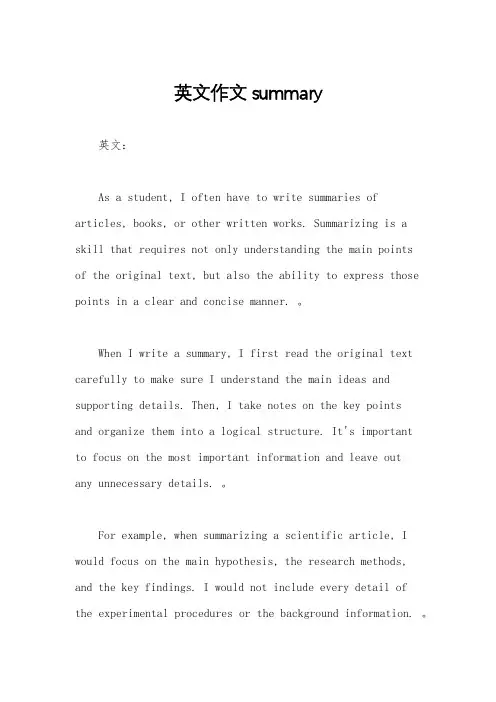
英文作文summary英文:As a student, I often have to write summaries of articles, books, or other written works. Summarizing is a skill that requires not only understanding the main pointsof the original text, but also the ability to express those points in a clear and concise manner. 。
When I write a summary, I first read the original text carefully to make sure I understand the main ideas and supporting details. Then, I take notes on the key pointsand organize them into a logical structure. It's importantto focus on the most important information and leave outany unnecessary details. 。
For example, when summarizing a scientific article, I would focus on the main hypothesis, the research methods, and the key findings. I would not include every detail ofthe experimental procedures or the background information. 。
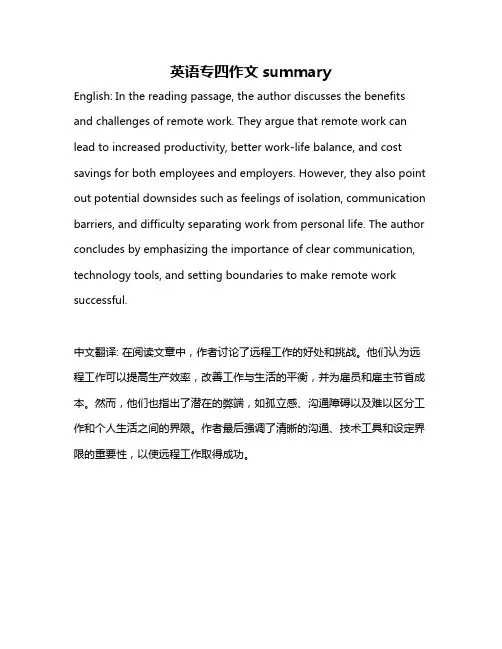
英语专四作文summary
English: In the reading passage, the author discusses the benefits and challenges of remote work. They argue that remote work can lead to increased productivity, better work-life balance, and cost savings for both employees and employers. However, they also point out potential downsides such as feelings of isolation, communication barriers, and difficulty separating work from personal life. The author concludes by emphasizing the importance of clear communication, technology tools, and setting boundaries to make remote work successful.
中文翻译: 在阅读文章中,作者讨论了远程工作的好处和挑战。
他们认为远程工作可以提高生产效率,改善工作与生活的平衡,并为雇员和雇主节省成本。
然而,他们也指出了潜在的弊端,如孤立感、沟通障碍以及难以区分工作和个人生活之间的界限。
作者最后强调了清晰的沟通、技术工具和设定界限的重要性,以使远程工作取得成功。

10篇英语summary范文1. A Summary of "The Great Gatsby""The Great Gatsby" is a classic novel written by F. Scott Fitzgerald, set in the 1920s during the Roaring Twenties. The story is narrated by Nick Carraway, a young man from a wealthy family who moves to West Egg, a wealthy suburb of New York City. He becomes neighbors with the enigmatic Jay Gatsby, a mysterious millionaire known for his lavish parties. As Nick becomes more involved in Gatsby's life, he learns about Gatsby's obsession with his lost love, Daisy Buchanan, and his efforts to win her back.The novel explores themes of love, wealth, and the American Dream. Gatsby's relentless pursuit of Daisy and his extravagant lifestyle reflect the superficiality and materialism of the era. The characters' moral decay and disillusionment serve as a critique of the Jazz Age. The tragic ending of the novel, with Gatsby's death and the disillusionment of the characters, highlights the emptiness of the American Dream and the hollowness of the pursuit of wealth and status.2. A Summary of "To Kill a Mockingbird""To Kill a Mockingbird" is a novel written by Harper Lee, set in the 1930s in the fictional town of Maycomb, Alabama. The story is narrated by Scout Finch, a young girl who grows up with her brother Jem and their father, Atticus Finch. The novel explores themes of racism, injustice, and morality through the trial of Tom Robinson, a black man falsely accused of raping a white woman.Atticus, a lawyer, defends Tom Robinson in court, despite facing backlash and prejudice from the townspeople. Through the trial, the novel exposes the deep-seated racism and prejudice in the town, as well as the courage and integrity of Atticus in standing up for what is right. The novel also addresses the loss of innocence and the coming-of-age of Scout and Jem as they witness the harsh realities of the world around them.3. A Summary of "1984""1984" is a dystopian novel written by George Orwell, set in a totalitarian society ruled by the Party and its leader, Big Brother. The story follows the protagonist, Winston Smith, as he rebels against the oppressive regime and seeks truth and freedom. The novel exploresthemes of surveillance, propaganda, and the power of language.In the world of "1984," the Party controls every aspect of people's lives, using surveillance and propaganda to maintain its grip on power. Winston, disillusioned with the Party's lies and oppression, begins a secret love affair with Julia, a fellow rebel. As they seek to defy the Party and find a sense of individuality and truth, they are eventually captured and tortured by the Thought Police.The novel serves as a warning against the dangers of totalitarianism and the erosion of individual freedom. It also highlights the manipulation of truth and language by those in power, as well as the resilience of the human spirit in the face of oppression.4. A Summary of "Pride and Prejudice""Pride and Prejudice" is a novel written by Jane Austen, set in 19th century England. The story follows the romantic entanglements of the Bennet sisters, particularly Elizabeth Bennet and Mr. Darcy. The novel explores themes of love, marriage, and social class.The main plot revolves around the developing relationship betweenElizabeth and Mr. Darcy, which is initially hindered by their pride and prejudice towards each other. As they navigate the obstacles of misunderstandings and societal expectations, they ultimately overcome their differences and find true love. The novel also delves into the lives of the other Bennet sisters and their pursuit of marriage and happiness.Through its witty social commentary and engaging characters, "Pride and Prejudice" offers a nuanced portrayal of the societal norms and expectations of the time. It critiques the superficiality and materialism of the upper class, while also celebrating the power of love and individual agency in shaping one's destiny.5. A Summary of "The Catcher in the Rye""The Catcher in the Rye" is a novel written by J.D. Salinger, narrated by the teenage protagonist, Holden Caulfield. The story follows Holden's experiences after being expelled from his prep school and his aimless wandering around New York City. The novel explores themes of adolescence, alienation, and the search for authenticity.Holden is disillusioned with the phoniness and hypocrisy of the adultworld, and he struggles to find his place in society. As he encounters various people and situations, he grapples with his own identity and the complexities of growing up. The novel also delves into the loss of innocence and the pain of Holden's past, as he grapples with the death of his younger brother, Allie."The Catcher in the Rye" is celebrated for its authentic portrayal of teenage angst and rebellion. It captures the universal experience of coming-of-age and the challenges of navigating the transition from adolescence to adulthood. Holden's candid and introspective voice resonates with readers, making the novel a timeless classic.6. A Summary of "The Old Man and the Sea""The Old Man and the Sea" is a novella written by Ernest Hemingway, set in Cuba. The story follows an aging fisherman, Santiago, as he embarks on a challenging fishing expedition in the Gulf Stream. The novella explores themes of perseverance, resilience, and the struggle against nature.Santiago, once a great fisherman, has fallen on hard times and struggles to catch fish. Despite his recent misfortune, he sets out ona journey to catch a giant marlin. The novella depicts his arduous battle with the marlin and the physical and emotional toll it takes on him. As he fights to bring the marlin back to shore, he faces numerous obstacles, including sharks that attack his catch."The Old Man and the Sea" is a timeless tale of human endurance and the indomitable spirit of man. Santiago's unwavering determination and courage in the face of adversity serve as a powerful metaphor for the human condition. The novella's poignant portrayal of the triumph of the human spirit has made it a classic in literature.7. A Summary of "Brave New World""Brave New World" is a dystopian novel written by Aldous Huxley, set in a futuristic society where technology and conditioning are used to control and manipulate people. The story follows the protagonist, Bernard Marx, as he rebels against the conformity and artificial happiness of the World State. The novel explores themes of individuality, freedom, and the dehumanizing effects of technology.In the World State, people are genetically engineered andconditioned to fit into predetermined social roles. They are kept docile and content through the use of pleasure-inducing drugs and mind control. Bernard, an outsider in this society, becomes disillusioned with the lack of genuine human connection and seeks to find meaning and authenticity in his life."Brave New World" serves as a cautionary tale about the dangers of a society driven by technology and consumerism. It raises thought-provoking questions about the nature of happiness and the price of conformity. The novel's exploration of the tension between individuality and societal control continues to resonate with readers today.8. A Summary of "The Scarlet Letter""The Scarlet Letter" is a novel written by Nathaniel Hawthorne, set in 17th century Puritan New England. The story follows Hester Prynne, a woman who is publicly shamed and ostracized for committing adultery and bearing a child out of wedlock. The novel explores themes of sin, guilt, and redemption.Hester is forced to wear a scarlet letter "A" as a mark of her shame,and she struggles to rebuild her life in the face of judgment and condemnation. The novel also delves into the inner turmoil of the Reverend Dimmesdale, who is secretly the father of Hester's child and grapples with his guilt and hypocrisy. The character of Pearl, Hester's daughter, serves as a symbol of both sin and innocence."The Scarlet Letter" is a powerful exploration of the human condition and the complexities of morality. It delves into the consequences of societal judgment and the search for redemption and forgiveness. The novel's timeless themes and rich symbolism continue to captivate readers and provoke thought and reflection.9. A Summary of "The Outsiders""The Outsiders" is a novel written by S.E. Hinton, set in the 1960s in Tulsa, Oklahoma. The story follows the rivalry between two groups of teenagers, the Greasers and the Socs, and the struggles of the protagonist, Ponyboy Curtis, to find his place in the world. The novel explores themes of class conflict, identity, and the bonds of friendship.Ponyboy and his friends, including his brothers Sodapop and Darry,navigate the challenges of growing up in a tough neighborhood and facing prejudice and violence from the Socs. The novel delves into the dynamics of the Greaser gang and their loyalty to each other, as well as the complexities of their relationships with the Socs. Through the characters' experiences, the novel offers a poignant portrayal of the impact of social class on individual identity and relationships."The Outsiders" is celebrated for its authentic portrayal of teenage life and the universal struggles of adolescence. It addresses the themes of friendship, loyalty, and the search for belonging, resonating with readers of all ages. The novel's enduring relevance and powerful storytelling have solidified its status as a classic in young adult literature.10. A Summary of "Animal Farm""Animal Farm" is a novella written by George Orwell, serving as a satirical allegory of the Russian Revolution and the rise of totalitarianism. The story is set on a farm where the animals, led by the pigs, revolt against the oppressive human farmer and establish their own society based on the principles of equality and freedom. The novella explores themes of power, corruption, and themanipulation of language.Initially, the animals' rebellion leads to a utopian society where all animals are equal and free. However, the pigs, led by Napoleon, gradually seize power and establish a dictatorship, exploiting and oppressing the other animals. The novella depicts the pigs' manipulation of the principles of Animalism and their betrayal of the original ideals of the revolution."Animal Farm" serves as a powerful critique of the dangers of totalitarianism and the corruption of power. It also highlights the manipulation of language and propaganda to control and deceive the masses. The novella's timeless themes and allegorical storytelling continue to resonate with readers, offering a compelling commentary on the nature of political power and human nature.。
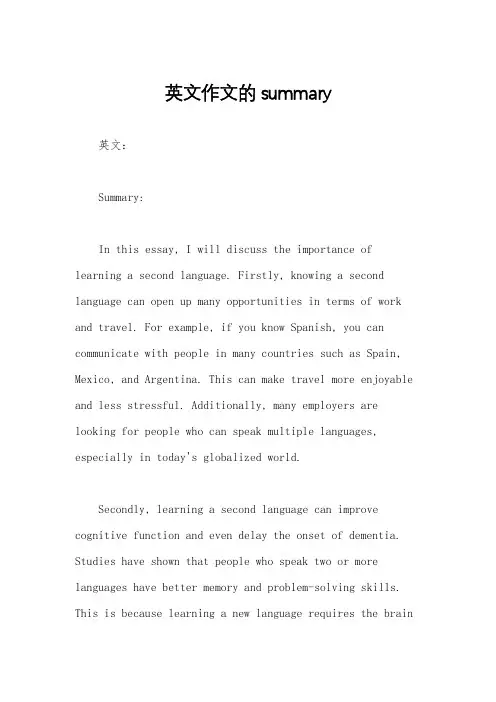
英文作文的summary英文:Summary:In this essay, I will discuss the importance of learning a second language. Firstly, knowing a second language can open up many opportunities in terms of work and travel. For example, if you know Spanish, you can communicate with people in many countries such as Spain, Mexico, and Argentina. This can make travel more enjoyable and less stressful. Additionally, many employers are looking for people who can speak multiple languages, especially in today's globalized world.Secondly, learning a second language can improve cognitive function and even delay the onset of dementia. Studies have shown that people who speak two or more languages have better memory and problem-solving skills. This is because learning a new language requires the brainto work harder and make new connections.Finally, learning a second language can also help you understand and appreciate different cultures. Language is closely tied to culture, and by learning a new language, you can gain insight into the customs, traditions, and values of other societies. This can lead to greater empathy and understanding, which is especially important in today's diverse world.Overall, learning a second language is a valuable skill that can benefit you in many ways. Whether it's for work, travel, or personal growth, the benefits of learning a new language are clear.中文:英文:总结:在这篇文章中,我将讨论学习第二语言的重要性。
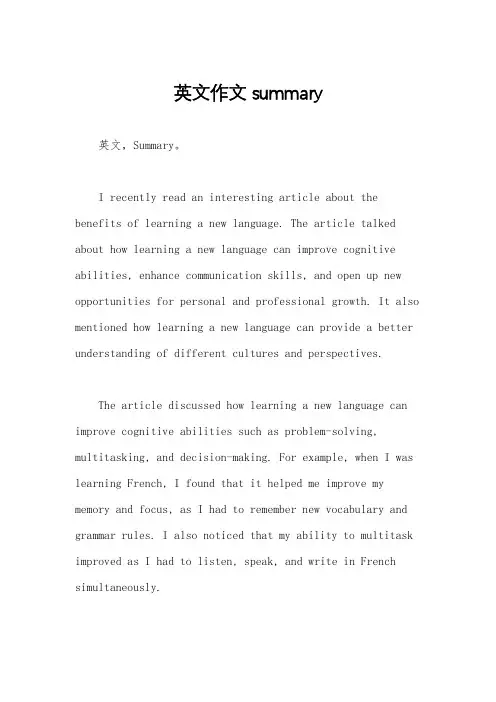
英文作文 summary英文,Summary。
I recently read an interesting article about the benefits of learning a new language. The article talked about how learning a new language can improve cognitive abilities, enhance communication skills, and open up new opportunities for personal and professional growth. It also mentioned how learning a new language can provide a better understanding of different cultures and perspectives.The article discussed how learning a new language can improve cognitive abilities such as problem-solving, multitasking, and decision-making. For example, when I was learning French, I found that it helped me improve my memory and focus, as I had to remember new vocabulary and grammar rules. I also noticed that my ability to multitask improved as I had to listen, speak, and write in French simultaneously.In terms of communication skills, the article highlighted how learning a new language can enhance one's ability to express thoughts and ideas effectively. When I started learning Spanish, I found that it not only improved my Spanish speaking skills, but also helped me become a better communicator in my native language. I became more aware of different language structures and how to convey ideas in a clear and concise manner.Moreover, the article emphasized how learning a new language can open up new opportunities for personal and professional growth. For instance, when I learned Mandarin, it allowed me to connect with new people and expand my network. It also gave me a competitive edge in the job market, as many employers value candidates who arebilingual or multilingual.In addition, the article discussed how learning a new language can provide a better understanding of different cultures and perspectives. When I learned Japanese, I not only gained insight into the language, but also developed a deeper appreciation for Japanese culture and traditions. Iwas able to connect with native speakers on a more personal level and understand their customs and way of thinking.Overall, the article made a compelling case for the benefits of learning a new language. It highlighted how it can improve cognitive abilities, enhance communication skills, and open up new opportunities for personal and professional growth. It also emphasized the importance of gaining a better understanding of different cultures and perspectives through language learning.中文,总结。
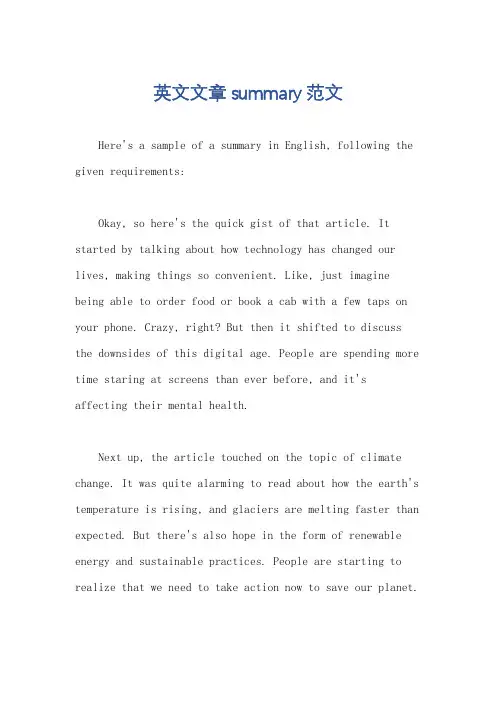
英文文章summary范文Here's a sample of a summary in English, following the given requirements:Okay, so here's the quick gist of that article. It started by talking about how technology has changed our lives, making things so convenient. Like, just imagine being able to order food or book a cab with a few taps on your phone. Crazy, right? But then it shifted to discuss the downsides of this digital age. People are spending more time staring at screens than ever before, and it'saffecting their mental health.Next up, the article touched on the topic of climate change. It was quite alarming to read about how the earth's temperature is rising, and glaciers are melting faster than expected. But there's also hope in the form of renewable energy and sustainable practices. People are starting to realize that we need to take action now to save our planet.Moving on, there was a section about education. It highlighted the importance of lifelong learning and therole of technology in making education more accessible. But it also raised the concern about the quality of education, especially in developing countries. There's still a long way to go in ensuring that every child has access toquality education.Finally, the article ended with a heart.。
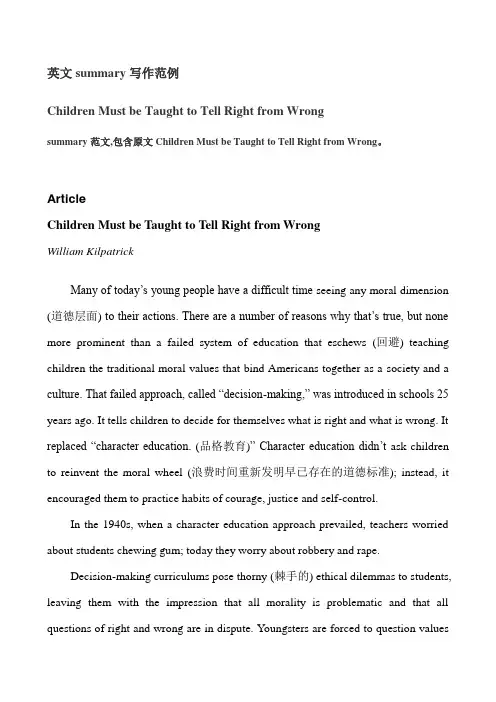
英文summary写作范例Children Must be Taught to Tell Right from Wrongsummary范文,包含原文Children Must be Taught to Tell Right from Wrong。
ArticleChildren Must be Taught to Tell Right from WrongWilliam KilpatrickMany of today’s young people have a difficult time seeing any moral dimension (道德层面) to their actions. There are a number of reasons why that’s true, but none more prominent than a failed system of education that eschews (回避) teaching children the traditional moral values that bind Americans together as a society and a culture. That failed approach, called “decision-making,” was introduced in schools 25 years ago. It tells children to decide for themselves what is right and what is wrong. It replaced “character education. (品格教育)” Character education didn’t ask children to reinvent the moral wheel (浪费时间重新发明早已存在的道德标准); instead, it encouraged them to practice habits of courage, justice and self-control.In the 1940s, when a character education approach prevailed, teachers worried about students chewing gum; today they worry about robbery and rape.Decision-making curriculums pose thorny (棘手的) ethical dilemmas to students, leaving them with the impression that all morality is problematic and that all questions of right and wrong are in dispute. Youngsters are forced to question valuesand virtues they’ve never acquired in the first place or upon which they have only a tenuous (薄弱的) hold. The assumption behind this method is that students will arrive at good moral conclusions if only they are given the chance. But the actual result is moral confusion.For example, a recent national study of 1,700 sixth- to ninth-graders revealed that a majority of boys considered rape to be acceptable under certain conditions. Astoundingly, many of the girls agreed.This kind of moral illiteracy is further encouraged by values-education (价值观教育) programs that are little more than courses in self-esteem (自尊). These programs are based on the questionable assumption that a child who feels good about himself or herself won’t want to do anything wrong. But it is just as reasonable to make an opposite assumption: namely, that a child who has uncritical self-regard will conclude that he or she can’t do anything bad.Such naive self-acceptance results in large part from the non-directive (无指导性的), non-judgmental (无是非观的), as-long-as-you-feel-comfortable-with-your-choices mentality (思想) that has pervaded (渗透) public education for the last two and one-half decades. Many of today’s drug education, sex education and values-education courses are based on the same 1960s philosophy that helped fuel the explosion in teen drug use and sexual activity in the first place.Meanwhile, while educators are still fiddling with (胡乱摆弄) outdated “feel-good” approaches, New York, Washington, and Los Angeles are burning.Youngsters are leaving school believing that matters of right and wrong are always merely subjective. If you pass a stranger on the street and decide to murder him because you need money—if it feels right—you go with that feeling. Clearly, murder is not taught in our schools, but such a conclusion—just about any conclusion—can be reached and justified using the decision-making method.It is time to consign (寄出) the fads (风尚) of “decision-making” and “non-judgmentalism” to the ash heap of failed polic ies, and return to a proved method. Character education provides a much more realistic approach to moral formation. It is built on an understanding that we learn morality not by debating it but by practicing it.SampleSummary of “Children Must be Taught to Tell Right from Wrong”In his essay “Children Must be Taught to Tell Right from Wrong,” William Kilpatrick argues fervently that the “decision-making”approach to the moral education of American youth, which replaced “character education” 25 years ago, has prevented juveniles from behaving and thinking in accordance with the traditional moralprinciples that are fundamental to American society.According to Kilpatrick, decision-making methods instill in students a wrong belief that all norms of morality are subjective constructs with only relative truth in them and therefore can be interpreted flexibly and even questioned. This belief deprives them of the chance to secure solid moral standards and induces misconceptions about what should be clearly right or wrong.In parallel with this inadequacy of the “de cision-making” approach are the unexpected outcomes of those values-education programs focusing on students’ self-esteem that subscribe to the “non-judgmental” mindset dominating “decision-making” curriculums. Their mistaken assumption that feeling good warrants morality excuses students from criticizing and disciplining their own behaviors.Basing his conclusion on his analysis of the fundamental flaws of the decision-making approach, Kilpatrick finally proposes an immediate shift back to character education which he believes teaches morality more effectively by emphasizing practice instead of discussion.。
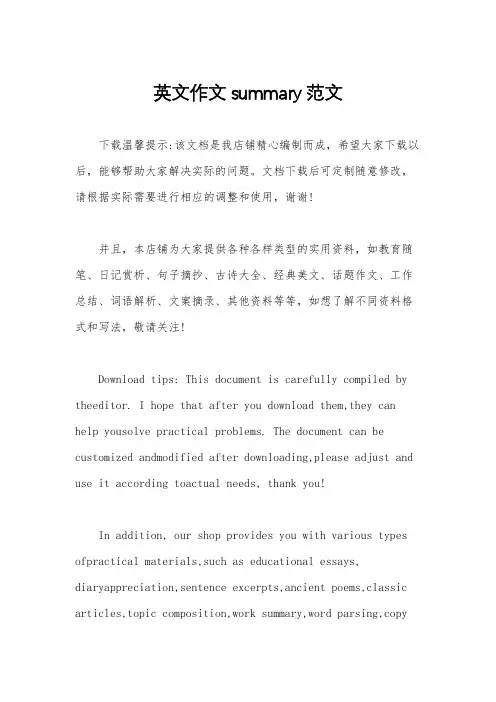
英文作文summary范文下载温馨提示:该文档是我店铺精心编制而成,希望大家下载以后,能够帮助大家解决实际的问题。
文档下载后可定制随意修改,请根据实际需要进行相应的调整和使用,谢谢!并且,本店铺为大家提供各种各样类型的实用资料,如教育随笔、日记赏析、句子摘抄、古诗大全、经典美文、话题作文、工作总结、词语解析、文案摘录、其他资料等等,如想了解不同资料格式和写法,敬请关注!Download tips: This document is carefully compiled by theeditor. I hope that after you download them,they can help yousolve practical problems. The document can be customized andmodified after downloading,please adjust and use it according toactual needs, thank you!In addition, our shop provides you with various types ofpractical materials,such as educational essays, diaryappreciation,sentence excerpts,ancient poems,classic articles,topic composition,work summary,word parsing,copyexcerpts,other materials and so on,want to know different data formats andwriting methods,please pay attention!I went to the park yesterday. It was really nice. There were a lot of people. Some were walking, some were sitting on the benches. I saw some kids playing on the grass. They looked so happy.I love reading books. It can take me to different worlds. I can learn a lot from them. Different books have different stories and ideas. It's amazing.My dog is so cute. He always follows me around. Helikes to play with his toys. When I come home, he wags his tail and greets me. He's my best friend.。
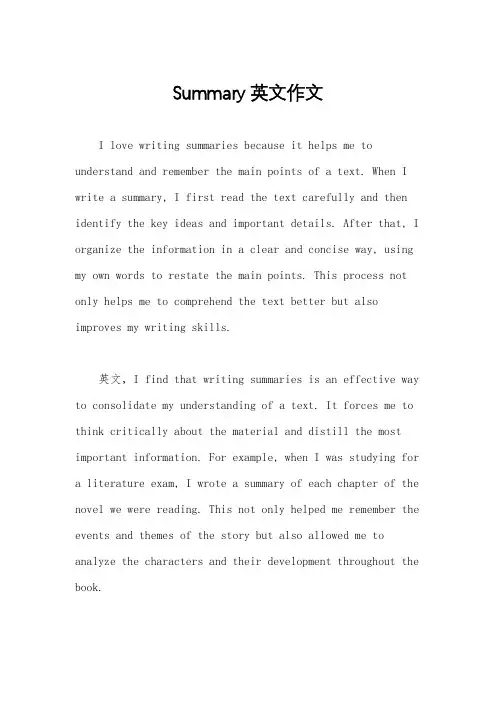
Summary英文作文I love writing summaries because it helps me to understand and remember the main points of a text. When I write a summary, I first read the text carefully and then identify the key ideas and important details. After that, I organize the information in a clear and concise way, using my own words to restate the main points. This process not only helps me to comprehend the text better but also improves my writing skills.英文,I find that writing summaries is an effective way to consolidate my understanding of a text. It forces me to think critically about the material and distill the most important information. For example, when I was studying for a literature exam, I wrote a summary of each chapter of the novel we were reading. This not only helped me remember the events and themes of the story but also allowed me to analyze the characters and their development throughout the book.中文,我发现写总结是巩固我对文本理解的有效方式。
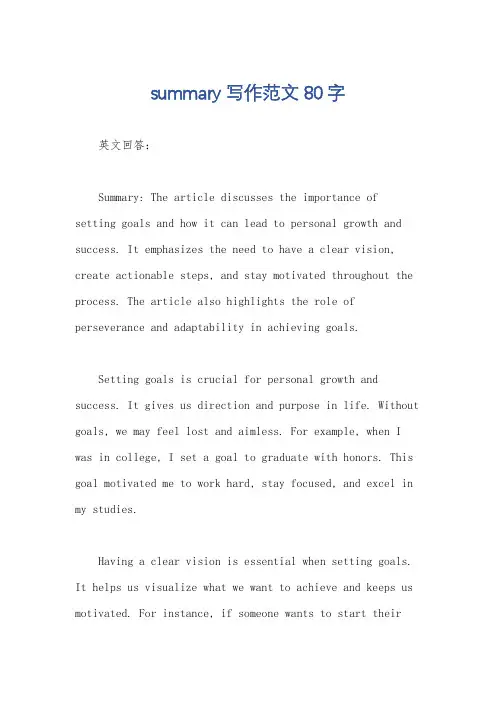
summary写作范文80字英文回答:Summary: The article discusses the importance ofsetting goals and how it can lead to personal growth and success. It emphasizes the need to have a clear vision, create actionable steps, and stay motivated throughout the process. The article also highlights the role of perseverance and adaptability in achieving goals.Setting goals is crucial for personal growth and success. It gives us direction and purpose in life. Without goals, we may feel lost and aimless. For example, when I was in college, I set a goal to graduate with honors. This goal motivated me to work hard, stay focused, and excel in my studies.Having a clear vision is essential when setting goals. It helps us visualize what we want to achieve and keeps us motivated. For instance, if someone wants to start theirown business, they should have a clear vision of what the business will look like and how it will operate. Thisvision will guide them in making decisions and takingaction towards their goal.Creating actionable steps is another important aspectof goal setting. It involves breaking down the goal into smaller, manageable tasks. This allows us to track our progress and stay motivated. For instance, if someone wants to run a marathon, they can start by setting smaller goals such as running a certain distance each day orparticipating in shorter races. These small steps will eventually lead them to their ultimate goal.Perseverance is key when working towards our goals. We may face obstacles and setbacks along the way, but it's important to stay determined and never give up. For example, when I started learning a new language, I faceddifficulties and felt frustrated at times. However, I persevered and kept practicing, which eventually led to fluency.Adaptability is also crucial in goal setting. Sometimes, our initial plans may not work out as expected, and we need to be flexible and open to change. For instance, if someone's goal is to get a promotion at work, but they face unexpected challenges, they may need to adapt their strategies or explore alternative opportunities. Being adaptable allows us to overcome obstacles and continue moving forward.In conclusion, setting goals is essential for personal growth and success. It provides us with direction, motivation, and a sense of purpose. By having a clear vision, creating actionable steps, and staying motivated,we can achieve our goals. Perseverance and adaptability are also important traits that help us overcome challenges and achieve success.中文回答:Summary: 本文讨论了设定目标的重要性,以及它如何促进个人成长和成功。
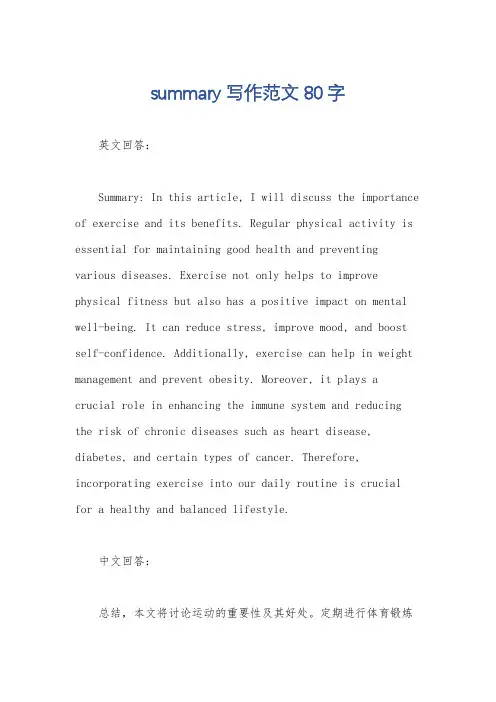
summary写作范文80字英文回答:Summary: In this article, I will discuss the importance of exercise and its benefits. Regular physical activity is essential for maintaining good health and preventing various diseases. Exercise not only helps to improve physical fitness but also has a positive impact on mental well-being. It can reduce stress, improve mood, and boost self-confidence. Additionally, exercise can help in weight management and prevent obesity. Moreover, it plays acrucial role in enhancing the immune system and reducing the risk of chronic diseases such as heart disease, diabetes, and certain types of cancer. Therefore, incorporating exercise into our daily routine is crucialfor a healthy and balanced lifestyle.中文回答:总结,本文将讨论运动的重要性及其好处。
定期进行体育锻炼对于保持良好的健康状况和预防各种疾病至关重要。
运动不仅有助于改善身体健康,还对心理健康产生积极影响。
它可以减轻压力,改善心情,并增强自信心。
高中英语summary范文高中英语写作中,对于summary这样的主题大家会写吗?下面是店铺给大家带来高中英语summary总结性范文,供大家参阅!高中英语summary范文篇What is a summary?Summary is a short passage giving the main points of an original article. What should we pay attention to when we write a summary? 主题文体记叙文 write a summary 人称议论文时态说明文记叙文的概括:1、时态2、人称 5要素3、____________读写任务(记叙文):时态、人称、5要素 Who WhatHowWhen wherePractice 1: Before my last birthday,my parents promised to celebrate my birt hday withsad me. I don’t have many unhappy memories but one story took place on my last birthday. Before the birthday, I worked out a plan with my parents. We planned to have dinner together in McDonald’s, my favourite restaurant. Then we would go to the Xinghai Concert Hall for a concert given by a group of famous young singers. And the most exciting thing, of course, was the birthday presents. They promised to give me a new MP3 player. However, something unexpected happened on that day. I went home as early as I could. I waited and waited but my parents didn’t come back. But they finally forgot and I felt angry. I felt angry at first and then upset. How could they treat me this way? They always forgot me just because they were busy with their work. Yes, they were always busy. They broke theirpromise and got home late. After that, my grandmother had a talk with me to help me understand my parents’ situation and that made me feel much better.After talking with my grandma, I felt better.A possible version:According to the passage,the author felt disappointed because his parents forgot to celebrate his last birthday with him. But he came to understand them after talking to his grandmother. Tips: 时态、人称、要素Practice 2: A little boy is telling his Grandma how “everything” is going wrong. School, family problem, severe health problems, etc. Meanwhile, Grandma is baking a cake. She asks her grandson if he would like a cake, which, of course, he does. “Here, have some cooking oil.” “Terrible!” says the boy. “How about a couple raw eggs?” “Terrible! Grandma!” “Would you like some flour then? Or maybe baking soda?” “Grandma, those are all awful!” To which Grandma replies, “Yes, all those things seem bad by themselves, but when they are put together in the right way, they make a wonderfully delicious cake!Grandma used the cake material to show him that…“The trials(考验) of life serve a meaningful purpose in making us stronger. Do not lose heart if life is not easy for you right now, but encourage yourself and know you will be much stronger mentally and physically because of the trials of life.”According to the passage, a little boy complained about problems in life. His grandmother used the cake material to teach him that the trials of life make people stronger.One beautiful spring day a red rose came out in a forest. The red rose looked at a cactus (仙人掌) and said, “ What an uglyplant full of thorns (刺)!” The pine tree said, “ Red rose, what kind of talk is this? Who can say what beauty is? You have thorns too.” The p roud red rose looked angrily at the pine and said, “You don’t know what beauty is. You can’t compare me to a cactus.” Spring passed, and the weather became very warm. Life became difficult as no rain fell. The red rose was dying. One day the red rose saw b irds suck water from the cactus. “Doesn’t it hurt when they bite into the cactus?” asked the red rose. “Yes, but the cactus does not like to see any birds suffer,” replied the pine. “The birds can bring water to you if you ask the cactus for help.” But the red rose felt too ashamed of its past words to ask.(记叙文)寓言文体: ____________ 时态:________________ 人称:____________________ Who What HowWhen where5要素a beautiful roselaughed at the cactus for its appearance felt ashamed when she saw the cactus giving water to help the birdsOnce a beautiful proud rose laughed at the cactus for its appearance. However, when the weather became dry, the rose felt ashamed of itself as she saw the cactus providing birds with water.Score: 4-5二.梗概写作的注意事项1.不要照抄原文。
Unit 1 SummaryHave you ever known anyone famous? If so, you may have found that they are remarkably similar to the rest of us. You may have even heard them object to people saying there is anything different about them. “I’m really just a normal guy,” protests an actor who has recently rocketed into the spotlight. There is, of course, usually a brief period when they actually start to believe they are as great as their worshipping fans suggest. They start to wear fancy clothes and talk as if everyone should hear what they have to say. This period, however, does not often last long. They fall back to reality as fast as they had originally risen above it all.What will it feel like to soar to such altitude and look down like an eagle from up high on everyone else? And what will it feel like to have flown so high only to wake from your dream and realize you are only human? Some only see the cruelty in losing something they had gained. They often make desperate attempts to regain what they lost. Often these efforts result in even greater pain. Some become bankrupt financially and emotionally. The only real winners are those who are happy to be back on the ground with the rest of us.Unit 2 SummaryChaplin is a great comic not only for his own mother country b ut more for the world. Chaplin’s Tramp was considered a little crude and thought that he had too much of an eye for the ladies and that his clothes gave him an appearance more like an Italian waiter than anything else. He resisted making a talking movie until 1936 when he made up a nonsense language which sounded like no known nationality. Chaplin achieved great success because he was an immensely talented man and the kind of comic who used his physical senses to invent his art as he went along. However, the collision between the need to be loved and the fear of being betrayed resulted in disaster in his emotional life which was shown in his movies. Eventually, life gave Chaplin the stable happiness, that is, his marriage with Oona O’Neil. Chaplin died on Christmas Day 1977.Unit 3. SummaryLife in a wheelchair is tough. Living on welfare is just like sharing a dinner of raw pet food with the cat. Many welfare clients do not have money to live a decent life. As a result, lying and cheating the welfare system for extra money becomes normal. However, some unusual individuals, who have made a choice to live a life of complete honesty, do tell the truth to caseworkers and declare any extra income they make. Being honest, however, is not without its problems. Caseworkers will greatly increase the frequency of their visits and leave behind a small mountain of paper work for the client to fill out. The rules say that not a penny is to be unaccounted for. Not a single gift, no matter how small, is to be unreported. These rules and the natural consequent lying unfortunately tend to transform caseworkers from being helpers of the poor to being detectives constantly searching for any forms of cheating.Unit 5. SummaryWhile loneliness is very common in the U.S., few people care to admit to it because it is perceived as (1)some sort of social disease. It is seen as admirable for American heroes to bravely go alone into the wilderness and for poets and philosophers (2)to seek out solitude. Some poets and philosophers, like William Wordsworth and John Milton and Henry David Thoreau, enjoy (3) inspiration from solitude. When an individual is not solitary out of choice, the experience is (4)both less enjoyable and productive. It is (5)our basic need to talk to someone not only about the big things but also about the little daily things. As a consequence, lonely people will talkabout the little things to themselves, the cat, the dog and, (6)most embarrassingly, to total strangers. Therefore, it’s important for ordinary people to (7)stay rational, make themselves comfortable at least temporarily, and find some grace and pleasure in their home.Unit 8. SummaryAs a young girl in a Negro town, Zora had no white neighbors, and to her, white people were only different in that they traveled through her hometown but didn’t live there. However, when she arrived at Jacksonville, she suffered a change. She was no longer Zora of Eatonville, but became the granddaughter of slaves. When she looked in a mirror, she was now looking at a little black girl. This, however, had no ill effect on her. To her, slavery was something in the past. The Civil War had made her full American citizen and had given her the opportunity to push ahead and succeed in life. She felt she had nothing to lose but everything to gain.。
英文简短的summary范文1.英文写作中的summary应该怎么写首先Summary的写作应该分为以下6步:①分段阅读首先,我们需要对整篇文章浏览一次,根据文中的标题、副标题等分段阅读。
②重读主动阅读文章,并把主题句、关键句以及对写作summary 有用的信息标记出来。
③概括在明确了每个分段的中心思想之后,用一句话概括出来。
注意:句中只需要关键点,不需要进行细节性的描述。
④主旨主旨句是一篇摘要的关键点,读者可从中获知整篇文章所要表达的内容。
因此,一定要写好主旨句。
⑤写summary 在写summary的时候一定要注意:在summary中需要写原作者和作品的名称,且要用现在时去写作,尽量避免使用原文内容。
除此之外,摘要的写作目的在于准确表达作者的观点,所以一定不可以添加自己的观点在里边。
⑥检查并修改在summary完成之后需要检查我们是否准确的将作者的观点表达出来了,如果没有问题的话,也还是需要从个事、语法以及标点等方面进行一次检查。
下边BayDue给大家分享一篇summary写作范文:Why do some animals die out?In the past two hundred years people have caused many kinds of animals to die out--to become extinct.People keep building houses and factories in fields and woods.As they spread over the land,they destroy animals’homes.If the animals can’t find a place tolive,they die out.Sixteen kinds of Hawaiian birds have become extinct for this reason.Other animals,such as the Florida Key deer,may soon die out because they are losing their homes.Hunters have caused some animals to become extinct,too.In the last century,hunters killed all the passenger pigeons in North America and most of the buffalos.Today they are fast killing off hawks and wolves.Pollution is killing many animals today,too.As rivers become polluted,fish are poisoned.Many die.Birds that eat the poisoned fish can’t lay strong,healthy eggs.New birds aren’t born.So far,no animals have become extinct because of pollution.But some,such as the bald eagle and the brown pelican,have become rare and may die out.Scientists think that some animals become extinct because of changes in climate.The places where they live become hotter or cooler,drier or wetter.The food that they eat cannot grow there any more.If the animals can’t learn to eat something else,they die.Dinosaurs may have died out for this reason.Summary:In the past two hundred years,many kinds of animals have died out.There are several reasons for it.First,people keep building houses and factories in fields and woods,which destroys animals’homes.Then,hunters’killing has also caused some animals to become extinct.Besides,some a nimals aren’t able to bear strong offspring and nor do they have enough food to eat because of pollution and climatic changes.。
Summary英文作文I had an amazing weekend! On Saturday, I went hiking with some friends. We decided to explore a new trail in the nearby mountains. The weather was perfect, with clear blue skies and a gentle breeze. As we hiked up the trail, we were surrounded by lush green trees and beautiful wildflowers. It was so peaceful and refreshing to be out in nature.After our hike, we went out for a delicious lunch at a local restaurant. We ordered a variety of dishes to share, including sushi, pizza, and burgers. The food was absolutely mouthwatering! We laughed and chatted as we enjoyed our meal, savoring every bite. It was a great opportunity to catch up with my friends and relax after our hike.In the evening, I attended a concert with my family. We were all huge fans of the band performing, so we werereally excited. The atmosphere was electric as we waitedfor the show to start. When the band finally took the stage, the crowd erupted in cheers and applause. The music wasloud and energetic, and we couldn't help but dance and sing along. It was such a fun and memorable experience.On Sunday, I spent the day at home, just relaxing and doing some chores. I cleaned my room and organized my closet, which felt really satisfying. I also took some time to read a book that I had been meaning to finish. It was nice to have a quiet day to myself and recharge for the week ahead.Overall, my weekend was filled with adventure, good food, and quality time with loved ones. It was the perfect balance of excitement and relaxation. I can't wait for the next weekend to come around so I can create more wonderful memories.。
summary范文十篇x1. Summary of The Great GatsbyThe Great Gatsby, written by F. Scott Fitzgerald and published in 1925, is widely regarded as one of the most important works of literature of the 20th century. The novel tells the story of Jay Gatsby, a mysterious, wealthy man who lives a life of luxury and extravagance. Gatsby is obsessively in love with Daisy Buchanan, the niece of a wealthy man who lives next door to him in West Egg. Gatsby spends his life trying to win Daisy back, from throwing extravagant parties to attempting to reinvent himself. However, Gatsby's excessive pursuit of Daisy leads him to a tragic end as Daisy's husband, Tom Buchanan, discovers Gatsby's true identity and reveals it to Daisy, leading her to reject Gatsby and stay with her husband. The novel is a powerful commentary on the hollowness of the American Dream and serves as a reminder of the danger of greed and obsession.2. Summary of To Kill A MockingbirdTo Kill A Mockingbird, written by Harper Lee and published in 1960, is a classic novel that has become a staple of American literature. The novel is set during the 1930s in a small townin Alabama and follows the story of the Finch family, particularly young Scout Finch and her brother Jem. Scout and Jem witness the unjust trial of Tom Robinson, a black man accused of raping a white woman, and come to understand the injustice of racism and inequality in the American south. The novel harshly criticizes racism, as well as its consequences, while also celebrating the courage of those who defy prejudice and stand up against injustice. With its moral depth and timeless messages, To Kill A Mockingbird is considered an American classic.3. Summary of The Catcher in the RyeThe Catcher in the Rye, written by J. D. Salinger and published in 1951, is one of the most iconic and influential works of American literature. The novel follows the story of Holden Caulfield, a cynical teenager who has been expelled from a series of prep schools. Holden decides to spend a few days in New York City before deciding his next move and reflects on his troubled life and relationships while narrating throughout. Though Holden wants to protect the innocence of childhood, he is unable to stop himself from succumbing to a vicious cycle of loneliness and unhappiness. The Catcher in the Rye captures the frustrations and anxieties of teenage life and its themesof alienation and identity make it a timeless classic.4. Summary of The Lord of the RingsThe Lord of the Rings, written by J. R. R. Tolkien and published in 1954, is a monumental work of fantasy literature. The novel follows the adventures of a group of hobbits, elves, humans, and wizards as they attempt to destroy the powerful Ring of Sauron and restore peace in Middle-Earth. Throughout their journey, the fellowship faces many obstacles, including an army of orcs, a gathering of the dark forces of Mordor, and a confrontation with the terrifying creature known as the Balrog. With its richly detailed world, complex characters, and thrilling narrative, The Lord of the Rings is an epic tale of adventure and heroism.5. Summary of The Grapes of WrathThe Grapes of Wrath, written by John Steinbeck and published in 1939, is a Pulitzer-winning novel that has become a classic work of American literature. The novel follows the Joad family, farmers from Oklahoma, as they travel to California in search of a better life. Along the way, they are confronted with many hardships, including poverty, disease, and discrimination. The novel paints a vivid picture of the lives of migrant workers in Depression-era America and servesas a powerful indictment of social and economic inequality. The Grapes of Wrath is an affecting and timeless story of struggle and resilience.6. Summary of 19841984, written by George Orwell and published in 1949, is a classic dystopian novel set in a future where totalitarianism has taken hold. The novel follows the protagonist, Winston Smith, as he attempts to resist the oppressive rule of the totalitarian government. He joins a resistance group in an attempt to overthrow the government, but his efforts are in vain and he is ultimately captured and tortured. 1984 paints a bleak picture of a future in which individual freedom and expression are stifled, and serves as a warning of the dangers of unchecked power and authority.7. Summary of The HobbitThe Hobbit, written by J. R. R. Tolkien and published in 1937, is a fantasy novel that has become a beloved classic. The novel follows the story of Bilbo Baggins, a home-loving hobbit, as he is pulled out of his comfortable life and sent on an unexpected adventure. Joined by a group of dwarves, Bilbo embarks on a quest to reclaim their kingdom from the dragon Smaug. Along the way, he faces many obstacles and is forced toconfront the darkness within himself. The Hobbit is an imaginative and exciting story of courage, friendship, and discovery.8. Summary of The Chronicles of NarniaThe Chronicles of Narnia, written by C.S. Lewis and published between 1949 and 1956, is a series of seven children’s fantasy novels. The first book, The Lion, The Witch and The Wardrobe, tells the story of four siblings who discover a magical wardrobe that transports them to the land of Narnia. In Narnia, they meet Aslan, a noble lion who acts as their guide and protector. The Chronicles of Narnia are much beloved for their imaginative world, enchanting characters, and moral lessons.9. Summary of The Picture of Dorian GrayThe Picture of Dorian Gray, written by Oscar Wilde and published in 1890, is a sophisticated Gothic novel that has become a literary classic. The novel follows the story of Dorian Gray, a handsome and wealthy young man whose beauty captivates everyone he meets. He makes a wish that his portrait will age instead of him, and soon his wish is granted. As Dorian gradually devotes himself to a life of debauchery and excess, his portrait reflects the physical and moral decline of his life.The Picture of Dorian Gray is a captivating tale of vanity, obsession, and the consequences of sin.10. Summary of Pride and PrejudicePride and Prejudice, written by Jane Austen and published in 1813, is a classic novel of romance and conflict. The novel follows the story of Elizabeth Bennet, a spirited young woman from a wealthy family, and Mr. Darcy, an eligible bachelor. Despite their initial mutual dislike, Elizabeth and Darcy eventually come to understand and fall in love with one another. At the same time, Elizabeth learns to overcome her own prejudices and find true happiness. With its sharp wit and timeless themes, Pride and Prejudice is a classic novel of love and social convention.。
英文作文summary范文The movie I watched last night was absolutely incredible. It was a thriller that kept me on the edge of my seat the entire time. The plot was full of unexpected twists and turns, and the acting was top-notch. I was completely engrossed from start to finish.The main character in the movie was a complex and intriguing individual. He was a bit of a rebel, always getting into trouble but with a heart of gold underneath it all. The actor who played him did an amazing job of bringing the character to life, and I found myself really rooting for him throughout the film.The setting of the movie was also really well done. It took place in a gritty, urban environment that added to the overall sense of tension and danger. The cinematography was excellent, with lots of dramatic lighting and camera angles that added to the suspense of the story.One of the things that really stood out to me aboutthis movie was the soundtrack. It was full of intense, pulse-pounding music that perfectly complemented the action on screen. The sound design overall was fantastic, with every gunshot and explosion feeling incredibly impactful.Overall, I would highly recommend this movie to anyone who enjoys a good thriller. It had everything you could want in a film – great acting, an engaging plot, and plenty of excitement. I can't wait to watch it again!。
The summary of “Nice Guys (And Girls) Finish Together”
In Nicholas D.Kristof’s“Nice Guys (And Girls) Finish Together”, which first appeared in the New York Times Magazine in 1997, he asserts that it is commendable that Japanese still value their civility, but in face of globalization, they should abandon the obsession with egalitarianism. Giving the game “musical chair”, once played by Japanese and American children as an example, he reveals an evidence of the cultural differences between Japanese and American. The former lays more emphasis on the balance of people’s relationship ra ther than on individual performance, while the latter tends to struggle for winning, even in some impolite manners.
Kristof describes a harmonious social environment in Japan. Formality and politeness can be seen everywhere in Japan. Kristof do not deny the wide existence of competitions in Japanese society, but he reveals that, from the perspectives of Japanese,the results of competitions aretrivial. Japanese actually are egalitarians. Theyhope that everyonecan play an equal part rather than become a superstar. They don’t r ecognize individual excellence but compromise to dull performance.On the contrary, the team spirit and group consciousness, cultivated from the birth of Japanese, are given great value.
The depression of the economy in Japan is associated with Japanese’s negative and conservative attitudes. Japanese are too much scared of making trouble. Even in business, Japanese subjectively ignore the existence of differences and concerned too much about others’ criticism. This cause some loss of profit. Also, the obsession of egalitarianism leads to a situation where only positive voice can be heard.Kristof connects this phenomenon to the fact that Japan is too populated. He asserts that in such situations, no one can survive if not take enough account for others.
Theauthor indicates the present situation of Japanese society. Japanese is making attempt to eliminate the obsessionwith harmony. Workers, companies are driven to struggle for their benefits and concern for their future. All these attempts are leading japan to a more prosperous country. On the other hand, the young Japaneseare getting more aggressive and ambitious. They become more eager for winning. Despite of some loss of civility, the author still holds a positive attitude towards this change and he owes it to the influence of globalization.。